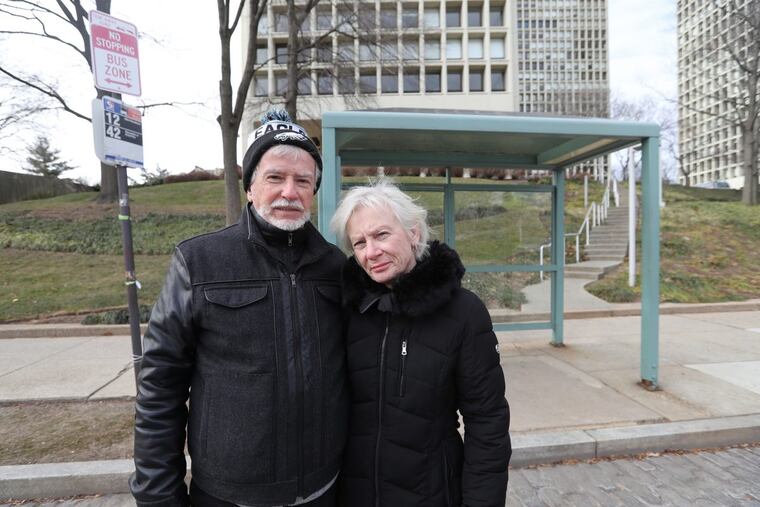For Philly's seniors, a long wait for SEPTA's new fare card
While the Key cards have become more widely adopted, senior citizens have turned out to be among the last to get on board due to a delayed production process in 2017.

Applying for the new SEPTA Key senior citizen card on Aug. 4 was a breeze, Harry McCullough, 74, recalled.
He walked into SEPTA's Market Street headquarters, had his picture taken in the basement near the vintage trolley car, and was told his new electronic fare card would show up in a few months.
"It only took 10 or 15 minutes," he said. "It all seemed to be going very well."
Nearly five months later, he's still waiting for that new card.
McCullough, who described himself as satisfied consumer of SEPTA's bus service, is one of what is likely thousands of seniors whose orders for SEPTA's new card have remained on hold for months. The problem hasn't meant losing out on the free rides available to them on the region's transit network, but the delays are extreme in some cases. And it has left older Philadelphians frustrated that they haven't been able to use the convenient new cards most transit riders have had access to since early 2017.
"If the world fell down and I never got this card, I could still ride on SEPTA," said Murray Dubin, who ordered his card in March, "but I'd be pissed off."
The long waits, SEPTA officials said, came from the way a subcontractor handled the senior Key cards when the fare program was introduced.
SEPTA had intended to make senior cards in-house, spokesman Andrew Busch said, but anticipated that there would be more demand than its office could handle when the cards first became available. Production would have to be farmed out, Busch said, and the prime contractor on the Key program, Conduent, hired American Banknote Corp.
ABCorp., based in Fort Lee, N.J., wouldn't process batches of cards smaller than 10,000 and waited until orders had piled up to that number before beginning printing, Busch said. Particularly delayed were cards ordered from July to October of this year, he said, since the initial rush of applications had diminished somewhat, and it took longer to reach 10,000 orders. So far, SEPTA has issued 96,892 senior cards.
The cost of the senior card printing was included in SEPTA's overall $157 million contract with Conduent. A more specific amount was not available Friday.
ABCorp. did not return a call Friday. Conduent referred questions to SEPTA.
The region's seniors have made their ire over the delays known, Busch said. SEPTA's customer service line, 215-580-7800, regularly hears from older riders asking where their Key card is.
SEPTA has addressed the backlog, Busch said, with 7,700 cards mailed the week ending Dec. 16. Those are the last cards ABCorp. was contracted to produce. Any new applications are being processed at SEPTA's 1234 Market St. headquarters or at Suburban Station, where the card can be issued the same day, or at the offices of Pennsylvania elected officials. Going through a legislator's office results in a week- to two-week turnaround time for a card to be delivered, Busch said. Applying for a card costs nothing but must be done in person because a photo is needed, he said.
The long turnaround doesn't explain why Dubin has waited nine months for his card, though. His wife, Libby Rosof, has waited even longer. She applied for her card in December 2016.
"You'd think after all this time someone ought to call and sheepishly say, 'We're sorry,' " she said.
The cards mailed two weeks ago should have arrived by now, Busch said. Anyone who still has not received a card should contact SEPTA's customer service.
Anyone 65 or older can ride buses, trolleys, or subway lines for free with a Senior Citizen Transit ID card or a Pennsylvania drivers' license issued before 2017. Licenses issued this year lack magnetic strips compatible with SEPTA's card readers. SEPTA will continue to accept both forms of identification for the foreseeable future, Busch said. Former rail workers use Railroad Retirement Cards. SEPTA was going to stop recognizing those cards on Jan. 1 but pushed back that deadline to Jan. 16 because of the problems shipping the senior Key cards.
About 530,000 Key cards are in circulation now, and the cards themselves have received high marks from users. They can be reloaded at the same kiosks that dispense them or can function much like an E-ZPass account, allowing the user to maintain a balance and link the card to a bank account. The card, which gives access to transit with a tap on a card reader, works on all city transit modes. Additional options on the card, such as multiple cards drawing on one account, are expected to be activated in 2018.
SEPTA Key is designed to eventually replace all the region's transportation fare tools, including tokens. The card has been largely limited to transit in the city, but an early adopter program that will introduce it to Regional Rail is slated to begin in spring 2018, Busch said.
Though the cards have been well-received, some of the technology surrounding them has not. Users complained that the screens on the kiosks selling cards, and the website designed to manage a Key account, were both confusing. SEPTA updated the user interface on the kiosks, and more changes are planned, but the website has proved a more difficult fix, and efforts to improve it will continue in 2018.
The Key project was plagued by delays nearly from the outset. Ordered in 2011, it was supposed to debut in 2013, but technical problems with Xerox, the original contractor hired to implement the system, pushed back its introduction to 2016. Building the Key system cost $27.1 million more than the original $122 million price tag.